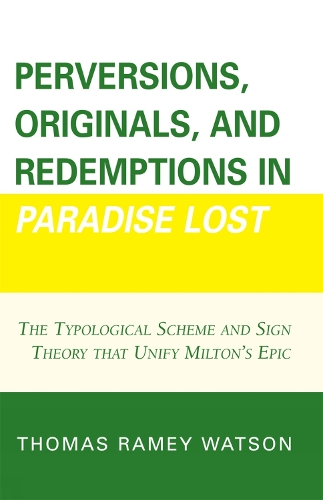
Perversions, Originals, and Redemptions in Paradise Lost: The Typological Scheme and Sign Theory that Unify Milton's Epic
(Paperback)
Publishing Details
Perversions, Originals, and Redemptions in Paradise Lost: The Typological Scheme and Sign Theory that Unify Milton's Epic
By (Author) Thomas Ramey Watson
University Press of America
University Press of America
20th June 2007
United States
Classifications
Tertiary Education
Non Fiction
821.4
Physical Properties
Paperback
200
Width 153mm, Height 231mm, Spine 17mm
308g
Description
In his epic Paradise Lost, John Milton employs, extends, and deepens the typological scheme that he believed to be embodied in, and known by, a close comparison of the scriptures of the Old and New Testaments. Using biblical typology as a point of departure, whereby the Hebraic scriptures are interpreted as prefigurations of the Christian New Testament, Milton developed a "sign theory," or semiotics, of his own. Like Saint Augustine, the first great and foremost framer of sign theory and Christian typology in the West, Milton believed that knowledge of typology and sign theory was crucial to understanding God's existence, power, and purpose in creation.
Milton's achievement was to dramatize this sign theory in his poetry, especially Paradise Lost. Professor Thomas Ramey Watson's analysis of Milton's sign theory begins with the context and framework of Augustinian sign theory and Milton's adaptation thereof. Professor Watson then explores the essential conflicts between St. Augustine's "City of God" and "City of Man" to contrast the godhead in Paradise Lost with the satanic underworld. Emphasizing Adam's dream-vision in Books 11 and 12, and the instruction he receives from the Archangel Michael in reading signs correctly, Professor Watson explores indepth the trajectory of Adam and Eve's downfall and subsequent resignation and regeneration.
Reviews
For those readers of Milton who know little about the Augustinian tradition, this study provides a necessary background against which to appreciate the structure and thematic content of Paradise Lost. * Renaissance Quarterly *
The remarkable achievement of this manuscript is to explicate how "signs" are evident in the very language of the epic, how, that is, the very language is informed with significance. The book develops "sign theory" with reference to Paradise Lost in exciting and new directions. No other study, to my knowledge, is as comprehensive and systematic and detailed in doing so. The research is extensive, the citations from secondary resources are apt, and the contributions in original thinking and interpretations are extraordinary. -- Albert C. Labriola, professor of English and Distinguished University Professor, Duquesne University; editor of Milton Studies; Honored Scholar of the Milton Society for 2000
Author Bio
Thomas Ramey Watson is an affiliate faculty member of Regis University's School for Professional Studies. He has served as the Episcopal chaplain (lay) for the Auraria Campus in Denver and taught English for the University of Colorado at Denver. He has trained as a psychotherapist, has done postdoctoral work at Cambridge University, and was named a Research Fellow at Berkeley Divinity School at Yale University. In addition to his scholarly writings, he is a published author of poetry and fiction.
